初中英语之看病
- 格式:docx
- 大小:13.12 KB
- 文档页数:1
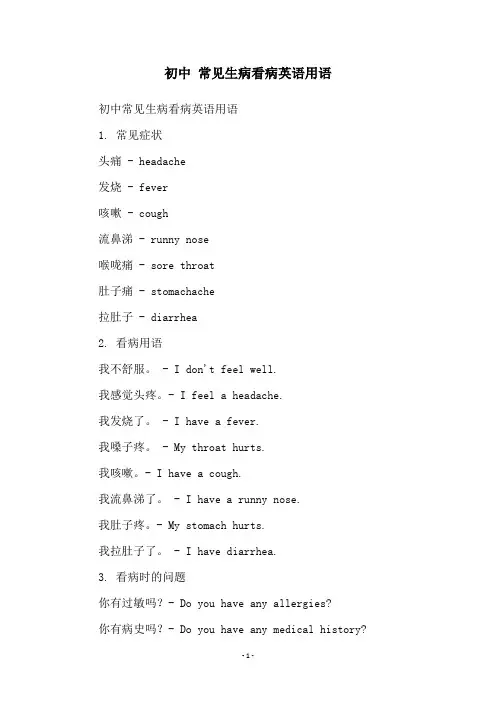
初中常见生病看病英语用语初中常见生病看病英语用语1. 常见症状头痛 - headache发烧 - fever咳嗽 - cough流鼻涕 - runny nose喉咙痛 - sore throat肚子痛 - stomachache拉肚子 - diarrhea2. 看病用语我不舒服。
- I don't feel well.我感觉头疼。
- I feel a headache.我发烧了。
- I have a fever.我嗓子疼。
- My throat hurts.我咳嗽。
- I have a cough.我流鼻涕了。
- I have a runny nose.我肚子疼。
- My stomach hurts.我拉肚子了。
- I have diarrhea.3. 看病时的问题你有过敏吗?- Do you have any allergies?你有病史吗?- Do you have any medical history?你现在在服用药物吗?- Are you taking any medication now?你吃过东西吗?- Have you eaten anything?你喝过水吗?- Have you had anything to drink?4. 看病时的建议你需要多休息。
- You need to rest more.你需要多喝水。
- You need to drink more water.你需要吃些药。
- You need to take some medicine.你需要去看医生。
- You need to go see a doctor.你需要去做检查。
- You need to go get checked.5. 看病后的建议你需要注意休息。
- You need to rest more.你需要按照医生的建议服药。
- You need to take your medication as prescribed by the doctor.你需要多喝水。
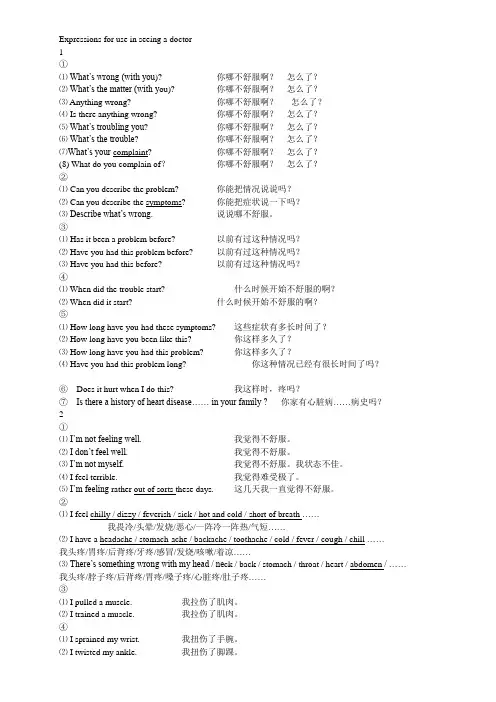
Expressions for use in seeing a doctor1①⑴ What’s wrong (with you)? 你哪不舒服啊?怎么了?⑵ What’s the matter (with y ou)? 你哪不舒服啊?怎么了?⑶ Anything wrong? 你哪不舒服啊?怎么了?⑷ Is there anything wrong? 你哪不舒服啊?怎么了?⑸ What’s troubling you? 你哪不舒服啊?怎么了?⑹ What’s the trouble? 你哪不舒服啊?怎么了?⑺What’s your complaint? 你哪不舒服啊?怎么了?(8) What do you complain of?你哪不舒服啊?怎么了?②⑴ Can you describe the problem? 你能把情况说说吗?⑵ Can you describe the symptoms? 你能把症状说一下吗?⑶ Describe what’s wrong. 说说哪不舒服。
③⑴ Has it been a problem before? 以前有过这种情况吗?⑵ Have you had this problem before? 以前有过这种情况吗?⑶ Have you had this before? 以前有过这种情况吗?④⑴ When did the trouble start? 什么时候开始不舒服的啊?⑵ When did it start? 什么时候开始不舒服的啊?⑤⑴ How long have you had these symptoms? 这些症状有多长时间了?⑵ How long have you been like this? 你这样多久了?⑶ How long have you had this problem? 你这样多久了?⑷ Have you had this problem long? 你这种情况已经有很长时间了吗?⑥Does it hurt when I do this? 我这样时,疼吗?⑦Is there a history of heart disease…… in your family ? 你家有心脏病……病史吗?2①⑴ I’m not feeling well. 我觉得不舒服。
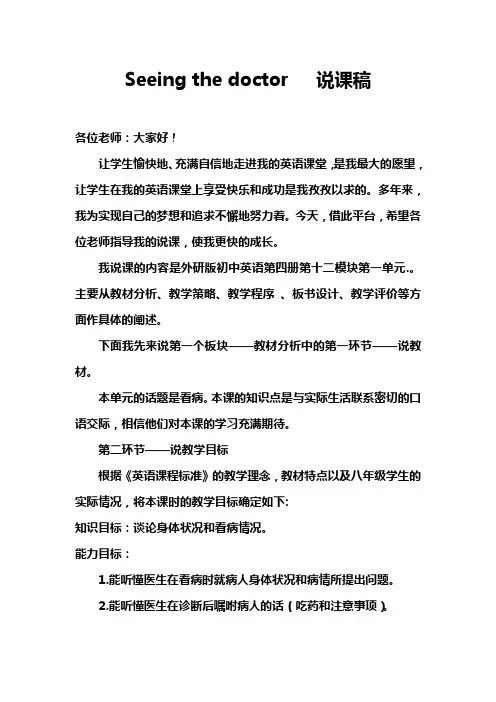
Seeing the doctor 说课稿各位老师:大家好!让学生愉快地、充满自信地走进我的英语课堂,是我最大的愿望,让学生在我的英语课堂上享受快乐和成功是我孜孜以求的。
多年来,我为实现自己的梦想和追求不懈地努力着。
今天,借此平台,希望各位老师指导我的说课,使我更快的成长。
我说课的内容是外研版初中英语第四册第十二模块第一单元.。
主要从教材分析、教学策略、教学程序、板书设计、教学评价等方面作具体的阐述。
下面我先来说第一个板块——教材分析中的第一环节——说教材。
本单元的话题是看病。
本课的知识点是与实际生活联系密切的口语交际,相信他们对本课的学习充满期待。
第二环节——说教学目标根据《英语课程标准》的教学理念,教材特点以及八年级学生的实际情况,将本课时的教学目标确定如下:知识目标:谈论身体状况和看病情况。
能力目标:1.能听懂医生在看病时就病人身体状况和病情所提出问题。
2.能听懂医生在诊断后嘱咐病人的话(吃药和注意事项)。
3.能够正确使用实义动词的过去时态,填写事故报告表。
思想目标:在与人交往中关心别人,关爱别人,使学生学会在别人生病时适当地嘘寒问暖,表达友爱。
在仔细研究教材和分析学生的心理和生理特点的基础上,我认为本课重点是:1.能简单说出医生看病时所用的语言。
2.利用所学语言与同学进行积极的交流和角色扮演。
第二个板块——说教学策略本课主要采用情景教学和交际功能法以及多媒体计算机辅助课堂教学,充分发挥教师的主导作用和学生的主体作用,利用现代教育技术优化教学过程,通过课件为学生创设更多生动活泼的语言环境,把学生吸引到活动中去,并激发他们主动参与学习的欲望。
努力培养学生的自学能力,把学习的钥匙交给学生,在传授知识的同时授以科学的思维方法。
不仅要使学生学会,更要使学生学会学,因此,在课堂教学中巧妙运用教学艺术,适当安排自学、小组讨论、当堂复述的竞赛等活动,鼓励学生开口就说,使学生在更轻松更愉快的环境下实现更多的信息交流,真正做到快快乐乐学英语,扎扎实实打基础,向四十分钟要质量,向课堂教学要效益的最终目的。
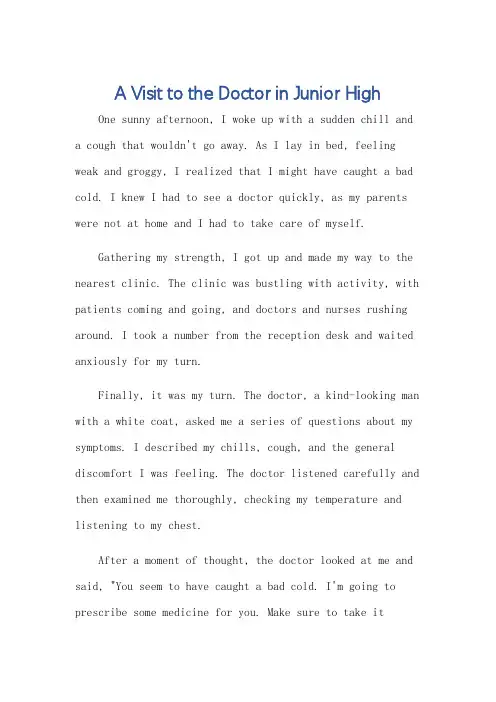
A Visit to the Doctor in Junior HighOne sunny afternoon, I woke up with a sudden chill and a cough that wouldn't go away. As I lay in bed, feeling weak and groggy, I realized that I might have caught a bad cold. I knew I had to see a doctor quickly, as my parents were not at home and I had to take care of myself.Gathering my strength, I got up and made my way to the nearest clinic. The clinic was bustling with activity, with patients coming and going, and doctors and nurses rushing around. I took a number from the reception desk and waited anxiously for my turn.Finally, it was my turn. The doctor, a kind-looking man with a white coat, asked me a series of questions about my symptoms. I described my chills, cough, and the general discomfort I was feeling. The doctor listened carefully and then examined me thoroughly, checking my temperature and listening to my chest.After a moment of thought, the doctor looked at me and said, "You seem to have caught a bad cold. I'm going to prescribe some medicine for you. Make sure to take itregularly and get plenty of rest. If your symptoms don't improve in a few days, please come back."I nodded and thanked the doctor. He wrote out the prescription and handed it to me. I collected my medicine from the pharmacy and made my way home.Back home, I followed the doctor's advice. I took my medicine regularly, drank plenty of warm water, and got plenty of rest. Gradually, my symptoms began to improve, and within a few days, I was feeling much better.This experience taught me the importance of taking care of my health and seeking medical attention promptly when needed. It also taught me the value of being independent and taking responsibility for my own well-being.**看病就医的初二经历**一个阳光明媚的下午,我醒来时突然感到一阵寒意,咳嗽声不断。
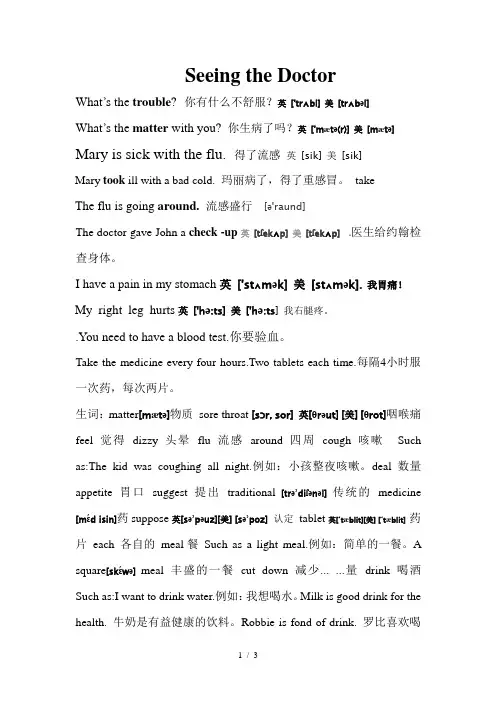
Seeing the DoctorWhat’s the trouble?你有什么不舒服?英['tr⋀bl] 美[tr⋀bəl]What’s the matter with you? 你生病了吗?英['mætə(r)] 美[mætə] Mary is sick with the flu. 得了流感英[sik] 美[sik]Mary took ill with a bad cold. 玛丽病了,得了重感冒。
takeThe flu is going around. 流感盛行[ə'raund]The doctor gave John a check -up英[tſek⋀p]美[tſek⋀p].医生给约翰检查身体。
I have a pain in my stomach英['st⋀mək] 美[st⋀mək].我胃痛!My right leg hurts英['hə:ts] 美['hə:ts] 我右腿疼。
.You need to have a blood test.你要验血。
Take the medicine every four hours.Two tablets each time.每隔4小时服一次药,每次两片。
生词:matter[mætə]物质sore throat [sƆr, sor] 英[θrəut] [美] [θrot]咽喉痛feel 觉得dizzy 头晕flu 流感around 四周cough 咳嗽Such as:The kid was coughing all night.例如:小孩整夜咳嗽。
deal 数量appetite 胃口suggest 提出traditional[trə’diſənəl]传统的medicine [mέd isin]药suppose英[sə’pəuz][美] [sə’poz]认定tablet英[‘tæblit][美] [‘tæblit]药片each 各自的meal餐Such as a light meal.例如:简单的一餐。


看病英语作文Seeing a Doctor: A Guide to Visiting the Doctor。
Seeing a doctor is an important aspect of maintaining good health. Whether you are dealing with a minor ailment or a more serious condition, it is important to seek medical attention when necessary. In this article, we will discuss the process of visiting a doctor and provide some helpful tips for making the most out of your visit.Step 1: Choosing a Doctor。
The first step in seeing a doctor is to choose one that is right for you. There are several factors to consider when selecting a doctor, including their location, specialty, and availability. You may want to ask for recommendations from friends or family members, or you can search online for doctors in your area.Step 2: Making an Appointment。
Once you have chosen a doctor, the next step is to make an appointment. Most doctors require patients to schedule appointments in advance, although some may accept walk-ins. When making your appointment, be sure to provide the receptionist with your name, phone number, and reason for the visit. You may also need to provide your insurance information.Step 3: Preparing for Your Visit。
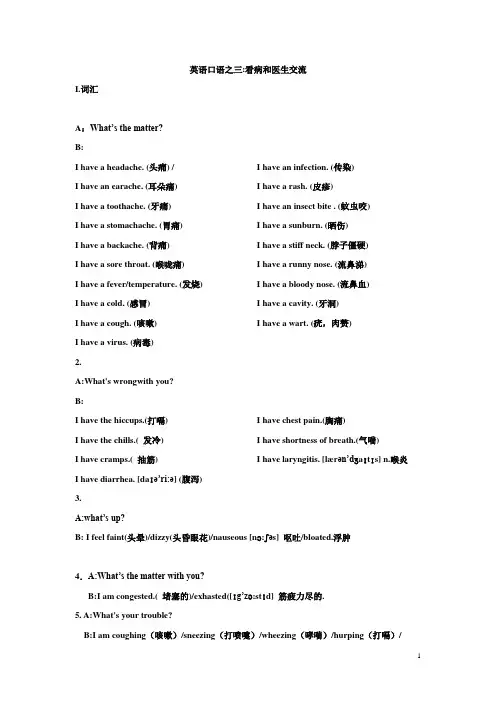
英语口语之三:看病和医生交流I.词汇A:What’s the matter?B:I have a headache. (头痛) /I have an earache. (耳朵痛)I have a toothache. (牙痛)I have a stomachache. (胃痛)I have a backache. (背痛)I have a sore throat. (喉咙痛)I have a fever/temperature. (发烧) I have a cold. (感冒)I have a cough. (咳嗽)I have a virus. (病毒) I have an infection. (传染)I have a rash. (皮疹)I have an insect bite . (蚊虫咬) I have a sunburn. (晒伤)I have a stiff neck. (脖子僵硬) I have a runny nose. (流鼻涕) I have a bloody nose. (流鼻血) I have a cavity. (牙洞)I have a wart. (疣,肉赘)2.A:What's wrongwith you? B:I have the hiccups.(打嗝)I have the chills.( 发冷)I have cramps.( 抽筋)I have diarrhea. [daɪə’ri:ə] (腹泻) I have chest pain.(胸痛)I have shortness of breath.(气喘)I have laryngitis. [lærən’dʒaɪtɪs] n.喉炎3.A:what’s up?B: I feel faint(头晕)/dizzy(头昏眼花)/nauseous [nɔ:ʃəs] 呕吐/bloated.浮肿4.A:What’s the matter with you?B:I am congested.( 堵塞的)/exhasted([ɪg’zɔ:stɪd] 筋疲力尽的.5. A:What's your trouble?B:I am coughing(咳嗽)/sneezing(打喷嚏)/wheezing(哮喘)/hurping(打嗝)/vomitting(呕吐)/bleeding(流血).6.A:What happened?B:I twisted my hand.扭伤手/I sprained my leg. 我扭伤了腿/I dislocated my arm. 我把肘部弄脱了/I scratched my eye我抓了我的眼睛./I bruised my knees我擦伤了膝盖/I burnt my arm.我烧伤了我的手臂/I broke my leg. 我腿断了/I hurt my waist我伤害了我的腰./I cut my finger. 我割破了我的手指。
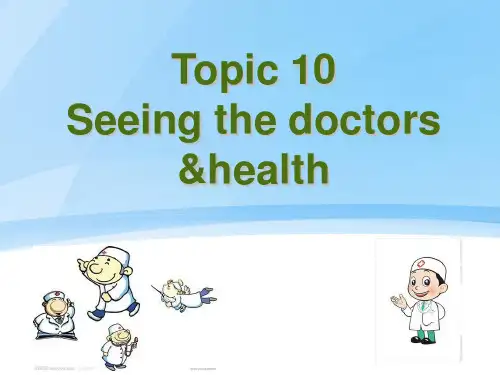
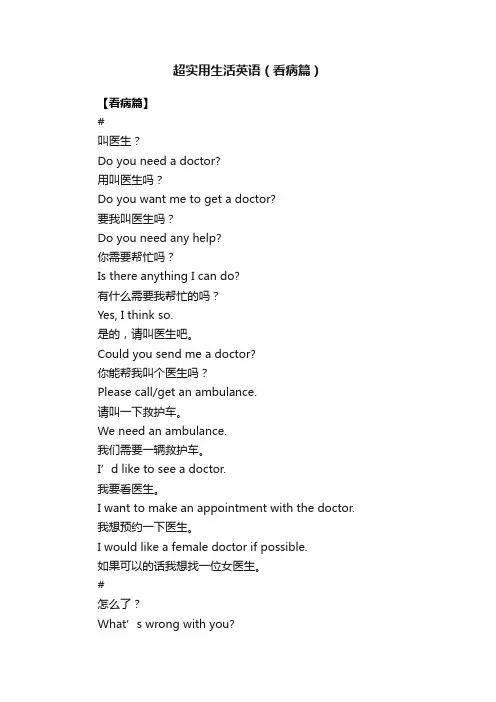
超实用生活英语(看病篇)【看病篇】#叫医生?Do you need a doctor?用叫医生吗?Do you want me to get a doctor?要我叫医生吗?Do you need any help?你需要帮忙吗?Is there anything I can do?有什么需要我帮忙的吗?Yes, I think so.是的,请叫医生吧。
Could you send me a doctor?你能帮我叫个医生吗?Please call/get an ambulance.请叫一下救护车。
We need an ambulance.我们需要一辆救护车。
I’d like to see a doctor.我要看医生。
I want to make an appointment with the doctor. 我想预约一下医生。
I would like a female doctor if possible.如果可以的话我想找一位女医生。
#怎么了?What’s wrong with you?你怎么了?What’s the matter?你怎么了?Is anything wrong with you?你不舒服吗?Are you (feeling)OK/all right?你还好吗?Is everything all right?你没事吧?#症状Oh, I caught a terrible cold.哦,我得了重感冒。
I've got a headache, a sore throat, a runny nose and even a fever.我头痛,嗓子痛,流鼻涕甚至发烧。
I have a fever of 39 degree.我发烧39度。
I’ve got a temperature.我发烧了。
I got the flu.我得了流行感冒。
I can’t stop coughing.我咳嗽不止。
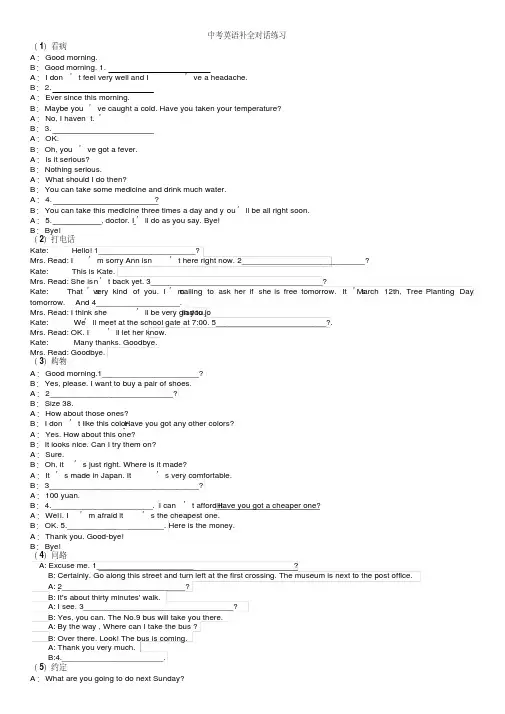
中考英语补全对话练习(1)看病A:Good morning.B:Good morning. 1.A:I don’t feel very well and I’ve a headache.B:2.A:Ever since this morning.B:Maybe you’ve caught a cold. Have you taken your temperature?A:No, I haven’t.B:3.A:OK.B:Oh, you’ve got a fever.A:Is it serious?B:Nothing serious.A:What should I do then?B:You can take some medicine and drink much water.A:4. ?B:You can take this medicine three times a day and y ou’ll be all right soon.A:5. , doctor. I’ll do as you say. Bye!B:Bye!(2)打电话Kate: Hello! 1______________________?Mrs. Read: I’m sorry Ann isn’t here right now. 2____________________________?Kate: This is Kate.Mrs. Read: She isn’t back yet. 3_______________________________________?March 12th, Tree Planting Day Kate: That’s very kind of you. I’m calling to ask her if she is free tomorrow. It’stomorrow. And 4___________________.Mrs. Read: I think she’ll be very glad to join you.Kate: We’ll meet at the school gate at 7:00. 5_________________________?.Mrs. Read: OK. I’ll let her know.Kate: Many thanks. Goodbye.Mrs. Read: Goodbye.(3)购物A:Good morning.1______________________?B:Yes, please. I want to buy a pair of shoes.A:2____________________________?B:Size 38.A:How about those ones?B:I don’t like this color. Have you got any other colors?A:Yes. How about this one?B:It looks nice. Can I try them on?A:Sure.B:Oh, it’s just right. Where is it made?A:It’s made in Japan. It’s very comfortable.B:3__________________________________?A:100 yuan.Have you got a cheaper one?B:4._______________________. I can’t afford it.A:Wel l. I’m afraid it’s the cheapest one.B:OK. 5.______________________. Here is the money.A:Thank you. Good-bye!B:Bye!(4)问路A: Excuse me. 1______________________ ?B: Certainly. Go along this street and turn left at the first crossing. The museum is next to the post office.A: 2____________________________?B: It's about thirty minutes' walk.A: I see. 3__________________________________?B: Yes, you can. The No.9 bus will take you there.A: By the way , Where can I take the bus ?B: Over there. Look! The bus is coming.A: Thank you very much.B:4._______________________.(5)约定A:What are you going to do next Sunday?B:1._______________________.A:Shall we go to the park and play football?B:2._______________________.A:3._______________________ ?.B:By bike.A:4.__________________ _____ ?.B:How about meeting at the gate of our school?A:5._______________________ ?B:At 8:30.A:OK. See you then.B:See you.(6 )采访A: Hello, Ann! May I ask you some questions?B. Certainly.A: 1._______________________ ?.B: I was born on May 18, 1990.A: Where were you born?B: I was born in England - in a small town near London.A: 2._______________________ ?.B: We lived there for about nine years. Then we moved to France.A:3.__________________ _____ ?.B: Because my father found work there.A:4. ?.B: We came to China two years ago.A: Do you enjoy living in China?B:5._______________________.Very much.(7)聊天A: Hi, Tom! Come in, please.B: Hi! 1._______________________ ?.A: I'm looking for information about Sydney on the Internet. I'm going to Sydney for my holiday.B: 2._______________________ ?A: No, but my father has been there twice. He told me there were many places of interest thereB: When are you leaving?A: I'm leaving at 9 a.m on Friday, July.B:3.__________________ _____ ?.A: I will go there by plane.B: Have you ever flown in a plane?A: 5._____________________.B: You must be excited when you fly in a plane.A: Really, I can't wait for it.(8) 计划B: I'm going to Shenzhen to see my parents. 1._______________________ ?.A: I'd like to go on a trip.B: That sounds great! 2._______________________ ?.A: London.B: Really? You're a lucky guy. You can watch the Olympic Games in London. 3._______________________ ?. A: I'll go with my parents.B: How long are you staying there?A: For three weeks. We'll get back in late August.B: Well, 4._______________________.Send me a postcard from London.A: Sure.真题演练1.(2013长沙)A: Hello, Betty. What did you do last summer vacation?B: I visited my uncle.A: 70 ?B: He lives in Dalian, a beautiful city.A: 67 ?B: I stayed there for a week. 68 ?there.A: No, I haven’t. But I’m going to spend a holidayB: You’d better go to Dalian in summer. So you can enjoy swimming in the sea.A: 69 . I will go there this summer vacation.B: 70 ?A: By plane.2.(2014长沙)A: How is it going, Amy?B: 71. . My math has improved a lot and I got a good mark in the last exam.A: Good news. 72. ?B:I’m reading a passage about Michelle Obama, the US first lady.A:73. ?B: I think she is successful, hard-working and energetic.A: I think so. Have you heard that she visited China in March?[来源:学+科+X+X+K]B:74. .A: How did you get the news?B: I got it on the Internet. By the way, you looked so tired. What did you do last night?A: I just stayed at home, watching the 2014 World Cup until the early morning.B: Sounds great. 75. ?A: I like Messi best, one of the most popular football player in the world.B: He is really amazing!What a pity! I missed last night’s matches.3.(2015长沙)A: Hey , Frank,71.________________________?B: Pretty good.A: Did you have fun last weekend?house with my friends and have a good timeB: 72. _______________. I went to the old people’sA: Wow, What did you do there?B: We helped the old clean their houses and chatted with them. How about you?A: I just read a science magazine.[来源:]B: Oh, really ? 73. _____________________?A: Hum… it is about the main cause of smog (雾霭) and ways to beat it.B:Great! But 74 . ______________________?A: We can live a greener life by using cleaner energy to solve the pr oblem, I think.B: You do?A: Yes, natural gas is a good choice. By the way,75. _________________________?7:45 now.B: It’sA: Oh, God. Hurry up or we’ll b e late.B: OK.4.(2010湘潭)A:You look a little worried, Betty. (76) ?B:Mum, it seems that I'm getting heavier these days.A:That's a problem. Can I offer you some advice?B:Sure. (77) ?A:First of all, stop eating too much. Secondly, (78) .B:But I'm afraid I am too busy to exercise.A:Then why not join a club on weekends?B:(79) ?A:YB:(80) . Thank you, mum. [来源:学科网ZXXK]A:You're welcome. I hope it will help. you can join the swimming club. You want to learn to swim, don't you?5.(2010湘潭)A: What are you going to do after the exams?B:(76) . Do you have any good ideas?A: Yes l went to relax myself .So I want to go on a trip6: Sounds great!(77)A: I'd like to go somewhere interesting and exciting.B: There is a new zoo in Changsha (78) ?A: No, I haven't .What about you?B: (79) . But my cousin went there last week. He told me people could watch the animals there in a more natural environment.A: Really? That sounds interesting. Let's go to the zoo together B: OK. We can go th ere by bus tomorrow.A:(80) ?It's not too far from here. And riding a bike is a kind of good exercise .B. OK I can't wait.6.(2011湘潭)B: I'm going to Shenzhen to see my parents. (76) ?A: I'd like to go on a trip.B: That sounds great! (77) ?A: London.B: Really? You're a lucky guy. You can watch the Olympic Games in London. (78) ?A: I'll go with my parents.B: (79) ?A: For three weeks. We'll get back in late August.B: Well, (80) ! Send me a postcard from London.A: Sure.7.(2012湘潭)A: What can I do for you?B: (76) .A: A scarf? Who would you like to buy it for?B: (77) . Tomorrow is my mother’s birthday. I’d like to buy her a present. A: I see. What color does your mother like?B: (78) .A: Oh, your mother has a very nice taste. Red scarves look beautiful. Come this way.(79) ? It looks nice and it’s made of silk.B: It feels soft and smooth. I like it. (80) ?A: Only 150 yuan. It’s cheap.B: OK. I’ll take it.8.(2013株洲)A: Good afternoon.B: Good afternoon.A: Welcome to the English Corner. 71 . ?B: I am from Grade Nine.A: How long have you been learning English?B: 72.A: Why do you come to the English Corner?B: 73.A: What advice can you give to the English Corner?B: 74.A: Great. You speak good English.B: 75.9.(2011株洲)A: (75)_____________________________?B: Yes, please. I want a sweater for my daughter.A: Look! Here are some sweaters for girls.(76)_____________________________?B: Size M.A: Do you like this red one?B: Yes. My daughter likes red best. (77)________________________?A: $25.B (78)____________________.Do you have any cheaper ones?A: How about this one? It’s only$18.B: Ok, I’ll take it. Here’s the money.(79)_________.A: You’re welcome.10.(2012株洲)A: Hello, Nice to meet you!B: 71._________________________! How long have you been in Zhuzhou?A: For half a year.B: 72._________________________?A: It is a beautiful city.B: Why did you come to study here?A: Because my father got a job here.B: Oh, 73.________________________?A: He is a policeman.B: Cool, I want to be a policeman, too. 74.________________________ ?A: I want to be a singer.B: 75.________________________?A: Because I like singing very much.。
有关看病的英语短句下面是店铺为大家整理的有关看病的英语短句,欢迎大家学习!用叫医生吗?Do you need a doctor?Do you need a doctor? (用叫医生吗?)Yes, I think so. (是的,请叫医生吧。
)Do you want me to get a doctor?Do you need any help? (需要帮忙吗?)请叫救护车。
Please call an ambulance. *ambulance“救护车”。
We need an ambulance now.Please get an ambulance.我要看病。
I'd like to see a doctor.我觉得身体不舒服。
I'm not feeling well.你能帮我请位医生吗?Could you send me a doctor?你怎么啦?What's wrong with you?What's the matter?Is anything wrong?是什么症状?What are your symptoms? *symptom“症状”。
量一下体温吧。
Let me check your temperature. *temperature“体温”、“温度”。
吃了什么不对劲的东西没有?Did you eat something unusual?量一下血压吧。
Let me check your blood pressure.你常服用什么药?Are you taking any medication regularly? *一般把药称为medicine,但是医生问诊的时候常用medication。
我没服用任何药。
I'm not taking any medication. *medication 是医生的常用语言,意为“药物”。
I'm not taking any medication. (我没服用任何药。
英语口语100主题——看病Seeing a doctor key words关键词汇症状:have a cold 患感冒flu 流感have a cough 咳嗽have a sore throat 嗓子痛have a stomachache 胃痛have a toothache 牙痛have a fever 发烧feel dizzy 头晕feel sick 恶心cancer 癌,恶性肿瘤infect 传染药品:medication 药物pills 药丸tablet 药片power 药粉mixture 合剂eye drops 眼药antibiotic 抗生素vitamin 维他命(维生素)aspirin 阿司匹林non-drowsy 不使人困倦治疗:first aid 急救recover 复原,痊愈send for a doctor 请医生feel one’s pulse 量脉搏take one’s blood pressure 量血压take one’s temperature 量体温give a prescription/write out a prescription 开药take medicine/ take pills 吃药get/ have an injection 打针bandage 扎上绷带sentences句型一、医生询问病情的常用问句:1. What's wrong/the matter(with you)?你怎么了?2. How are you(feeling)now?你现在觉得怎么样?3. Have you got a headache/a cough?你头痛/咳嗽吗?4. When did you feel unwell?你什么时候觉得不舒服的?5. When did the pain start?疼痛何时开始的?6. Did you sleep well?你睡得好吗?7. How long have you been like this?你像这样多久了?8. Did you eat anything for breakfast?你早饭吃了什么没有?·54 二、病人诉说病情的常用语句:1.I don't feel very well./I'm not feeling well.我感到不舒服。
情景交际---- 看病篇【交际用语】I . 医生询问病情:1.What's wrong(with you)?\What’s the matter (with you)?\W hat’s the trouble(with you )? 你怎么不舒服?2.Is there anything wrong \the matter with you ?4. How are you feeling today? 你今天感觉如何?5. Are you feeling better today? \ Are you better ? 你今天感觉好些吗?6. How long have you been like this? 你像这样多久了?7. When did he fall ill ? 你什么是有病?8. Do you have a fever ? 你发烧吗?9. Did you eat anything for breakfast ? 你吃饭了吗?10 .Have you slept well? | Did you sleep well ? 你睡好了吗?11. How are you (now)?How is her mother ? 你现在怎么样?II . 病人描述病情(病人反映情况)1. I don't feel very well. / I'm not feeling well. 我感觉不舒服。
2. I'm feeling very ill / terrible / bad |sick\tired. 我感觉不舒服。
3. My … hurts. 我某部位痛I have got a pain here .\in my back \in my head .4. I've got a cough .(咳嗽) a fever (发烧) a cold (感冒)5. I have got a stomachache /a toothache / headache 我胃(牙/头)疼。
初中英语新课程标准教材英语教案( 2019 — 2020学年度第二学期 )学校:年级:任课教师:说课稿 / 初中说课稿 / 初中说课稿范文编订:XX文讯教育机构初中英语《Seeing the doctor》说课稿教材简介:本教材主要用途为通过学习英语的内容,提高学生的语言技能,增加一项语言能力,有利于国际化的日常交流、生活、工作等,本说课稿资料适用于初中英语科目, 学习后学生能得到全面的发展和提高。
本内容是按照教材的内容进行的编写,可以放心修改调整或直接进行教学使用。
尊敬的各位评委:大家好!今天我说课的题目是初中英语《Seeing the doctor》,下面我就按说教材、说教法、说学法、说教学程序四个部分向各位评委说课。
一、说教材:1、教材的地位及作用:本单元的核心教学项目是“看病就医”(Seeing the doctor ),各课围绕这核心项目设计安排了听、说、读、写活动。
对话,课文及练习内容均取自于学生的日常生活,实用性强。
学生们会因为此话题的趣味性及实用性而感兴趣, 故能在学中用,用中学,印象深刻。
Lesson 71 课是语言训练课。
第一部分是一段有关饮食与健康关系的短对话,同时也为学生提供了语言训练的样板。
第二部分是以操练Link verb为宗旨的句型范例。
第三部分是所学语言知识的自然延伸,向学生介绍二位世界著名医学界人士Nightingale和Bethune。
2、教学目标:根据课程标准的要求和本课教学内容的特点,拟定以下教学目标:(1)知识目标:A、掌握本课中出现的四会单词、词组和句型,并在口、笔头中运用。
B、掌握情态动词have to与must的用法。
C、正确使用系动词的用法。
(2)能力目标:学会与他人讨论“健康”话题,培养他们的交际能力。
(3)情感目标:通过讨论“健康”来引起学生对身体健康的关注,引导学生养成良好的饮食习惯,讨论“名人”来引导学生树立远大抱负,并为之而努力奋斗。
3、确定以上教学目标的理论依据:⑴课程标准及教学内容的要求。
初二英语看病作文It was a typical weekday morning when I woke up with a throbbing headache and a stuffy nose. I knew I had caught a bad cold, and my first thought was to stay in bed and rest. But as the day progressed, my condition worsened, and I decided to visit the hospital.The hospital was a hive of activity, with people coming and going in a constant stream. I felt a bit overwhelmed as I walked towards the registration counter. The staff there was friendly and efficient, and they quickly guided me to the outpatient department.The doctor was a middle-aged man with a kind face. He asked me a series of questions about my symptoms and examined me thoroughly. After a few minutes, he diagnosed me with a bad cold and prescribed some medication.The pharmacy was just around the corner, and I quickly made my way there. The pharmacist was very helpful and explained each medication to me in detail, including its dosage and side effects. I was also advised to rest plenty and avoid exposure to cold weather.Back home, I followed the doctor's advice and took the medication regularly. Within a few days, my condition improved dramatically, and I was back to my usual self.This experience taught me the importance of seeking medical attention promptly when ill. It also made me appreciate the dedication and professionalism of themedical staff who are always ready to help in times of need. **就医体验:一次不寻常的看病经历**那是一个典型的工作日早晨,我醒来时头痛欲裂,鼻子也塞得难受。
中考英语阅读每日一练《看病》中考英语阅读每日一练《看病》每天都有很多人被病痛折磨着,但有些病却是因为一些不必要的担忧,正如本文中的tailor一样,威吓不少一点忧心,让自己健康快乐一点呢?A man went to see his doctor one day, because he was suffering from pains in his stomach. After the doctor had examined him carefully, he said to him, “Well, there’s nothing really wrong with you, I’m glad to say. Your only trouble is that you worry too much. Do you know, I had a man with the same trouble as you here a few weeks ago, and I gave him the same advice as I am going to give you. He was worried because he couldn’t pay his tailor’s bills. I told him not to worry about the bills any more. He took my advice and when he came to see me again two days ago, he told me that he now felt quite all right again. ” “Yes, I know all about that,” answered the patient sadly. “You see, I’m that man’s tailor!”根据以上短文内容判断正误,正确的用“T”表示,错误的用“F”表示。
看病
(1)There is something wrong with my back.我的后背有毛病。
(2) I've got a cough. 我咳嗽。
(3) I feel terrible. 我感到难受。
(4) I don't feel well. 我不舒服。
(5) I've got a pain. 我疼。
(6) This place hurts. 这个地方疼。
(7) What's wrong with you? 你怎么了?
(8) What's the matter? 你怎么了?
(9) What's your trouble? 你怎么了?
(10) I don't feel like eating. 我不想吃。
(11) Take this medicine three times a day.服这种药,一天三次。
(12) It's nothing serious. 不严重。
(13) You'll be all right. 你会好的。
(14) You'll get well soon. 你很快就会康复。
(15) Take it easy. 别紧张。
(16) Drink more water and have a good rest.多喝水,多休息。
(17) How long have you been like this?这种情况已经有多久了?
(18) I've got a headache and a cough. 我头疼,咳嗽。
(19) Let me look over you. 让我给你检查检查。
(20) Have you taken your temperature? 你量过体温了吗?。